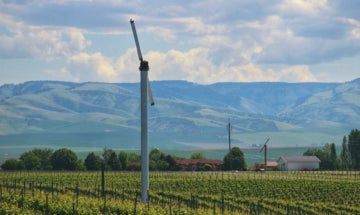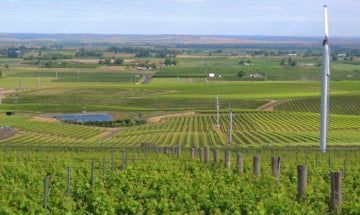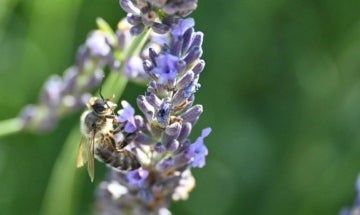The Vineyards
Estate Vineyards
Our estate vineyards—Pepper Bridge, Seven Hills, and Octave—produce some of the most sought-after grapes in the state. Furthermore, these vineyards are leaders in the practice of sustainable agriculture. We are committed to environmental stewardship, implementing the following regenerative farming practices within the vineyards:
- Adding compost to the soil to restore the soil humus.
- Using drip irrigation and buried soil-moisture monitors to ensure we do not waste water by irrigating below the roots of the vines.
- Leaving some ground cover un-mowed to preserve the habitat for beneficial insects encouraging a balanced ecosystem.
- Planting wild roses and leaving blackberries where they exist to provide winter habitat for a parasitic wasp that attacks leafhoppers.
- Utilizing organic products in place of harsh chemicals to control powdery mildew.
- Director of Winemaking Jean-François Pellet plays an active role in management of the vineyards quoting, "The ultimate goal is to make quality wine and leave the soil healthier for future generations."
How much water does a wine grape need?
Wine grapes are grown to keep the skin to juice ratio in balance during winemaking. This is because the skin is where the flavor, smell, and tannins are. An underwatered grape vine can restrict the fruit development can lead to reduced yeilds and less wine for us to enjoy. Underwatering can also reduce the canopy growth (aka the leaves) and leave the fruit exposed to the sun resulting in sunburned grapes. An overwatered grape vine could have wild vigorious canopies, letting no sun into the grapes which results in green vegital flavors. Or too much water could lead to huge gapes that have too much juice to skin ration leading to unflavorful, uninteresting wines.
So, how much water does a wine grape need? Roughly 12-24 inches of water per year.
What factors influence irrigation needs?
- Climate: hotter and dryer need more irrigation.
- Soil Type: sandy soils drain quickly and require more frequent irrigation, where clay soils retain water longer due to their poor drainage.
- Vineyard Practices: limiting water intentionally to concentrate flavors, or watering to establish canopy.
- Vine Age: young vines (1-3 years) need more just like trees so they can grow a root system.
- Seasonal Timing: spring (bud break to bloom) shoots are growing so you water to support the canopy. Summer (veraison) there is a lag in watering so the flavors concentrate, also known as keep the berry size in check! Fall (ripening), this is were the rainfall does the watering for the most part.
How do you measure the water in the vineyard?
We use rain gauges, soil probes, and sap flow monitoring.




